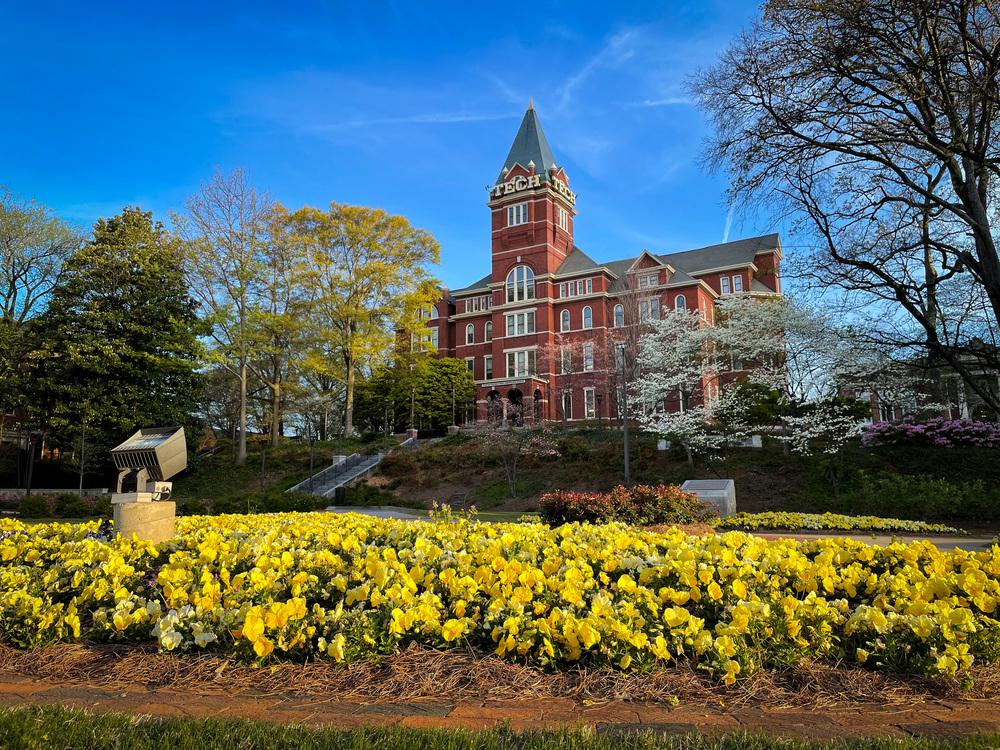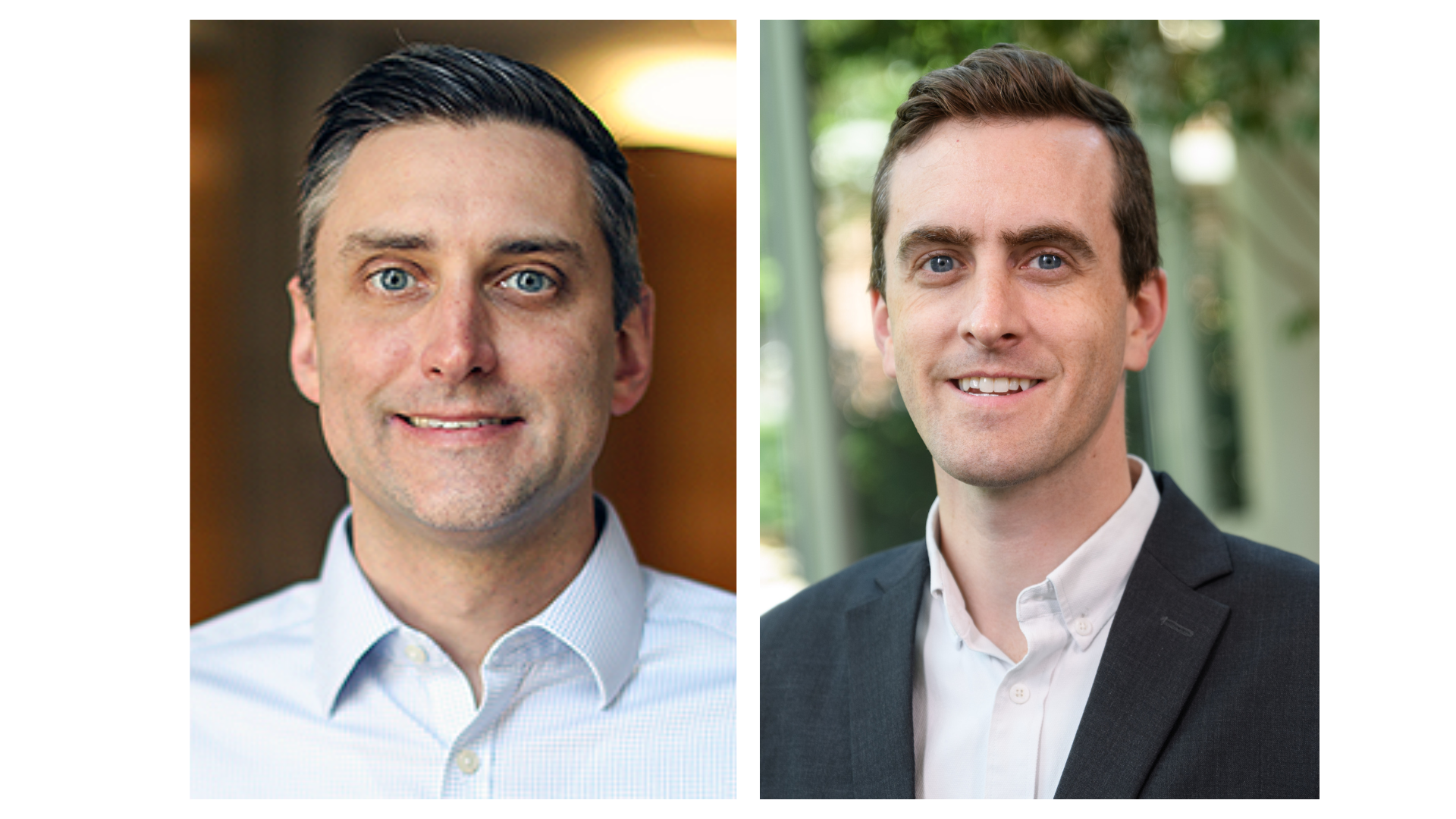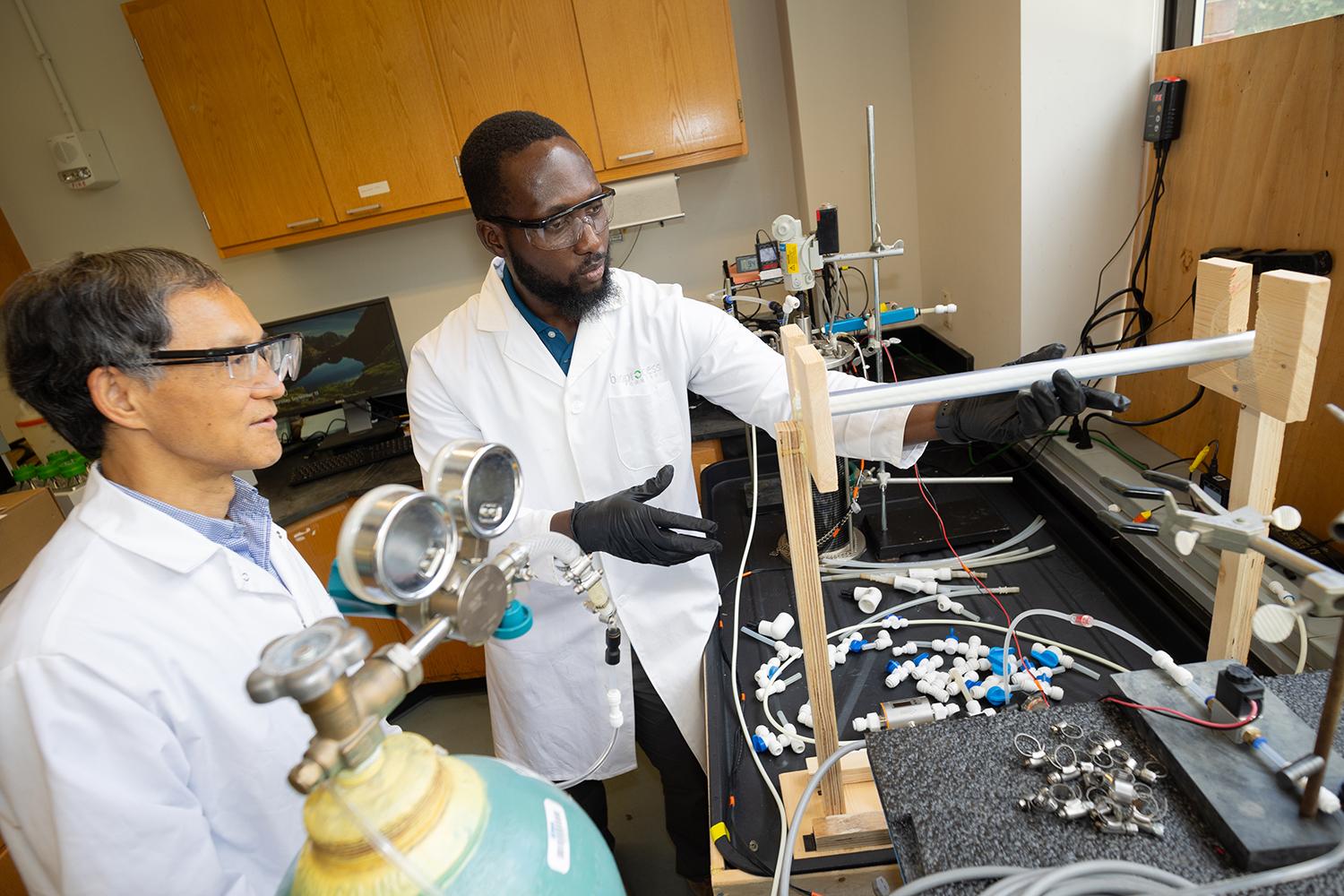BBISS Insights Series - 10/2
We look forward to hosting you at three upcoming events. The BBISS Insight Series aims to address the evolving needs of the BBISS community through in-person and virtual events to help GT researchers amplify their impact in sustainability research.
For the fall semester, the series will feature speakers with experience engaging government agencies for partnerships and proposal development. These sessions are designed to help researchers identify research opportunities and partners to build an impactful research program.
Georgia Tech Researchers Named Finalists for Prestigious Blavatnik Science Awards
Sep 09, 2025 — Atlanta, GA

Headshots of Matthew McDowell and Ryan Lively
Two Georgia Tech researchers in the College of Engineering have been named finalists for the 2025 Blavatnik National Awards for Young Scientists. Their discoveries, which could create cleaner industrial processes and safer, more reliable batteries, have important potential impacts for daily life.
The Blavatnik Awards are presented by the Blavatnik Family Foundation and are administered by the New York Academy of Sciences. They honor the most promising early-career researchers in the U.S., across life sciences, chemistry, and physical sciences, and engineering. The awards are among the most prestigious and competitive in science.
This dual recognition underscores Georgia Tech’s growing national leadership in high-impact, interdisciplinary research.
Ryan Lively, Thomas C. DeLoach Jr. Endowed Professor in the School of Chemical and Biomolecular Engineering, is recognized in the Chemical Sciences category for pioneering scalable technologies that will reduce industrial carbon emissions and energy use. He develops new materials that can capture carbon and separate chemicals, using much less energy than conventional methods. His innovations could make industry cleaner and play a key role in addressing climate change.
Matthew McDowell, Carter N. Paden Jr. Distinguished Chair in the George W. Woodruff School of Mechanical Engineering holds a joint appointment in the School of Materials Science and Engineering. Recognized in the Physical Sciences and Engineering category for groundbreaking battery research, he and his team develop new materials to make batteries last longer and store more energy. He has discovered ways to visualize how battery materials change during use — insights that help improve the performance and safety of future energy technologies.
This year’s 18 finalists were selected from 310 nominees. On Oct. 7, 2025, three laureates will be announced at a gala at New York City’s American Museum of Natural History. Each laureate will receive $250,000, the largest unrestricted scientific prize for early-career researchers in the U.S.

Shelley Wunder-Smith
‘Biochar’ Can Naturally Clean the Pollution that Rain Washes Off Georgia’s Roads
Jul 10, 2025 — Atlanta, GA

Professor Yongsheng Chen (left) and Ph.D. student Ahmed Yunus work with a wastewater reactor system in the lab. (Photo: Candler Hobbs)
A charcoal-like material made from leaves and branches that collect on forest floors could be a cheap, sustainable way to keep pollution from washing off roadways and into Georgia’s lakes and rivers.
Engineers at Georgia Tech and Georgia Southern University have found that this biological charcoal, or biochar, can be mixed with soil and used along roadways to catch grimy rainwater and filter it naturally before it pollutes surface water.
Their tests found the biochar effectively cleans contaminants from the rainwater and works just as well in the sandy soils of the coastal plain as in the clays of north Georgia. Their biochar-soil mixture can be easily substituted for expensive material mined from the earth that’s typically used on roads.
Though they focused on Georgia, the researchers said the findings could easily apply across the U.S., providing a simple, natural way to keep road pollutants out of water sources. They published their approach in the Journal of Environmental Management.
Learn about their system on the College of Engineering website.
Joshua Stewart
College of Engineering
RBI Visioning Session 1
Georgia Tech’s RBI Unveils State-of-the-Art Multiphase Forming Lab
May 13 marked a historic date for Georgia Tech’s Renewable Bioproducts Institute (RBI) and its home in the Paper Tricentennial Building with the grand opening of the Multiphase Forming Lab, the first significant building renovation in 30 years. Built in the 1990s, the Paper Tricentennial Building commemorates 300 years of U.S. papermaking history and supports research and education in paper science and engineering.
RBI Fall 2025 Lunch and Learn + Visioning 2
RBI’s Annual Workshop Fosters Collaboration, Innovation for Pulp and Paper Manufacturing
May 25, 2025 —
The Renewable Bioproducts Institute (RBI) 2025 Spring Workshop, held May 12–13, brought together leading researchers, industry professionals and students to explore innovations in pulp and paper manufacturing. Hosted at the Kendeda Building and the Paper Tricentennial Building, the event opened with remarks from Carson Meredith, RBI executive director, and featured presentations on energy and resource efficiency, carbon accounting and competitiveness.
Highlights included talks on membrane separations, electrochemical processing and low-carbon fuels, with contributions from experts such as Chris Luettgen, Jose Gonzalez, Sankar Nair, Marta Hatzell and Dave Beck.
Insights from the 2025 RBI Spring Workshop
- Revolutionizing Kraft Pulping with Graphene Oxide Membranes
Georgia Tech’s rGO membrane technology is transforming the kraft pulping process. These membranes enable efficient black liquor dewatering, organic acid recovery and lignin fractionation—leading to significant energy savings, water recycling and new revenue streams from bioproducts. - North America’s Dual Challenge: High Emissions, High Opportunity
While North America remains a pulp and paper powerhouse (15% of global capacity), it also has one of the highest carbon intensities. This presents both a challenge and an opportunity to lead in emissions reduction through asset renewal and innovation. - Biogenic CO₂: From Emission to Asset
Kraft pulp mills emit large volumes of biogenic CO₂—an untapped resource. With carbon capture and utilization (CCUS), mills could generate up to $300 million annually in carbon removal credits, turning emissions into economic value. - Integrated Biorefineries: The Future of Pulp Mills
The vision for pulp mills is evolving—from single-product facilities to multi-product biorefineries. Innovations like lignin-based materials, organic acid conversion to biofuels and advanced nanofiltration are paving the way for circular use of carbon in manufacturing. - Decarbonization Is a Strategic Imperative
With increasing regulatory and consumer pressure, especially from global brands targeting Scope 3 emissions, pulp and paper producers must act. Embracing technologies like rGO membranes and CCUS is not just sustainable—it’s essential for competitiveness. - Electrochemical Carbon Capture and Conversion for On-Site Fuel Production
Hatzell’s lab is pioneering the use of bipolar membrane (BPM) electrolysis to convert captured carbon (from bicarbonate solutions) into valuable fuels like CO and H₂. This approach enables:- 100% carbon utilization with more than 70% Faradaic efficiency for CO production.
- Integration with pulp and paper processes to valorize CO₂ emissions instead of storing them.
- Use of acid-stable single-atom nickel catalysts to improve selectivity and efficiency.
- The PAPER-ZERO Initiative
This initiative explores transformative pathways to decarbonize the pulp and paper industry by:- Evaluating scenarios that eliminate combustion of black liquor and waste wood.
- Investigating renewable energy integration and alternative uses for black liquor.
- Assessing the cost, energy and environmental trade-offs of emerging technologies.
The workshop also featured a student poster session, networking opportunities and updates on APPTI collaborative projects. The event concluded with a meeting of the RBI Industry Advisory Board, reinforcing the institute’s role as a hub for partnership and innovation in renewable bioproducts.
“We’re grateful to our industry member partners for sharing their time and expertise,” said Belinda Vogel, research engagement manager. “The advisory board meeting highlighted how essential collaboration is in advancing basic science and renewable bioproduct manufacturing.”
Cyrus K. Aidun: A Pioneering Force in Engineering Innovation at Georgia Tech
May 15, 2025 —
In particular, Aidun has focused on industrial competitiveness. His efforts to reduce energy and water consumption in fiber composite products have attracted significant attention and funding. This research is critical for developing sustainable and cost-effective manufacturing processes while reducing environmental impact.
As principal investigator, Aidun has received funding for major projects from the Department of Energy’s Office of Energy Efficiency and Renewable Energy (DOE-EERE, with Devesh Ranjan as co-principal investigator), the DOE’s Advanced Research Projects Agency-Energy, and the Defense Advanced Research Projects Agency (with Art Rangauskas at the University of Tennessee). These projects are affiliated with Aidun’s development of the Multiphase Forming Lab at Georgia Tech’s Renewable Bioproducts Institute (RBI).
The only one of its kind in North America, this innovative system significantly reduces the amount of water required to process paper. As a result, the heat and energy needed to dry the paper — typically an energy-intensive process — are also reduced. The Multiphase Former uses up to 70% less water, which substantially lowers the energy required for drying. This research, which began about five years ago, has drawn broad interest from industry. A more recent project, funded by DOE-EERE and led by Carson Meredith, combines Multiphase Forming with the latest technologies in refining and drying.
Aidun earned his bachelor’s and master’s degrees from Rensselaer Polytechnic Institute and completed his Ph.D. at Clarkson University in 1985. He joined the Woodruff School in 2003 after serving two years as a program director at the National Science Foundation. He began at Georgia Tech in 1988 as an assistant professor at the Institute of Paper Science and Technology. Previously, he was a research scientist at Battelle Research Laboratories, a postdoctoral associate at Cornell University, and a senior research consultant at the National Science Foundation’s Supercomputer Center at Cornell.
Aidun has received several national and international honors, including the National Science Foundation Presidential Investigator Award, the Gunnar Nicholson Fellowship, and the L.E. Scriven Award from the International Society of Coating Science and Technology.
John Xu Appointed Director of New Multiphase Forming Lab
May 20, 2025 —
The only one of its kind in North America, this innovative system significantly reduces the amount of water required to process paper. As a result, the heat and energy needed to dry the paper—typically an energy-intensive process—are also reduced. The Multiphase Forming Lab uses up to 70% less water, which substantially lowers the energy required for drying.
Xu brings over 20 years of experience in managing laboratory paper machines and pilot testing equipment, along with a robust background in fluid mechanics, material science, and instrumentation development. His professional experience includes significant roles at International Paper, AstenJohnson, and Georgia Tech’s George W. Woodruff School of Mechanical Engineering.
"We are thrilled to have John lead the establishment and operation of this new facility," said Carson Meredith, RBI executive director. "His extensive knowledge and industry experience make him the ideal leader to partner with both RBI members and non-members to drive reduced energy consumption and costs.”
Xu's career is marked by innovative research and successful commercialization of new products and processes. At AstenJohnson, he served as a senior research scientist, specializing in forming and press fabrics used in the paper industry. His work led to the commercialization of several new forming and press products, and he managed pilot press stand at AstenJohnson and participated in papermaking trials at different pilot facilities to evaluate the performance of these fabrics.
Prior to AstenJohnson, Xu held positions at International Paper's Corporate Technology Center, where he managed the Microfinishing Lab and Humidity Resistant Liner Lab. His research provided critical insights that influenced the company’s major business decisions. He also developed various unique instruments for different paper mills at International Paper.
Xu earned his Ph.D. in paper science and mechanical engineering from Georgia Tech’s Institute of Paper Science and Technology. His doctoral research focused on the measurement of fiber suspension flow and forming jet velocity profile using Pulsed Ultrasonic Doppler Velocimetry (PUDV). He also holds a B.S. in Material Science and Engineering from Tsinghua University in Beijing, China.
For more information about the Multiphase Forming Lab, please contact: Hanjiang (John) Xu at hanjiang.xu@me.gatech.edu
